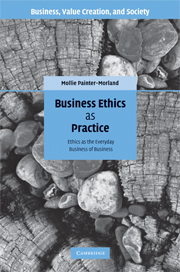Book contents
- Frontmatter
- Contents
- List of tables
- Preface
- Foreword
- Acknowledgements
- 1 Introduction: the dissociation of ethics from practice
- 2 Reconsidering approaches to moral reasoning
- 3 Moral agency reconsidered
- 4 Reconsidering values
- 5 Leadership and accountability
- 6 Reconsidering ethics management
- Index
- References
4 - Reconsidering values
Published online by Cambridge University Press: 22 September 2009
- Frontmatter
- Contents
- List of tables
- Preface
- Foreword
- Acknowledgements
- 1 Introduction: the dissociation of ethics from practice
- 2 Reconsidering approaches to moral reasoning
- 3 Moral agency reconsidered
- 4 Reconsidering values
- 5 Leadership and accountability
- 6 Reconsidering ethics management
- Index
- References
Summary
My analysis of moral agency in Chapter 3 has direct implications for understanding not only the process of how a particular normative orientation comes into being, but also what comes to be regarded as moral truth. It precipitates a radical reassessment of how we make statements about “right and wrong.” In this chapter I focus on a concept that is central to the idea of moral truth within an organizational context, namely values. In my analysis, I will challenge some of the conventional ways in which business ethicists and practitioners tend to think about and treat values.
In the case of the Federal Sentencing Guidelines' directives on what constitutes a proper ethics management program, organizations are instructed to formalize their ethics and compliance standards and procedures. As Chapter 1 indicated, there has been a lot of discussion about whether formalized codes really make a difference to employees' ethical behavior. Many are skeptical and argue that these documents often amount to little more than a decorative plaque on the wall or a reputation-enhancing marketing device.
A further interrogation of the validity of these charges is not the main purpose of my analysis. Instead, I would like to take a closer look at some of the unarticulated assumptions that often underlie the use of codes in ethics management programs and initiatives. In my experience, the practical value of codification is limited.
- Type
- Chapter
- Information
- Business Ethics as PracticeEthics as the Everyday Business of Business, pp. 130 - 178Publisher: Cambridge University PressPrint publication year: 2008

